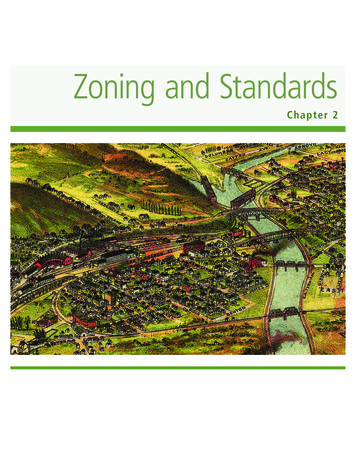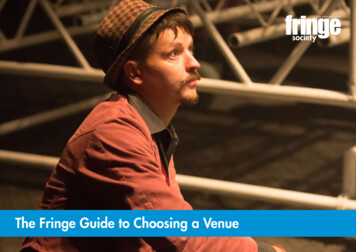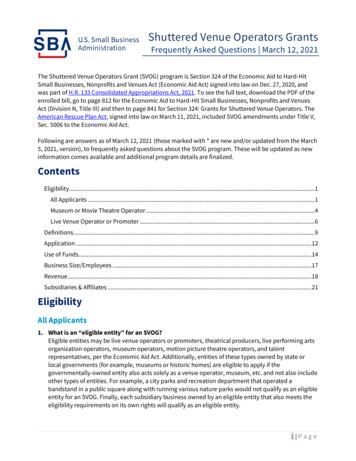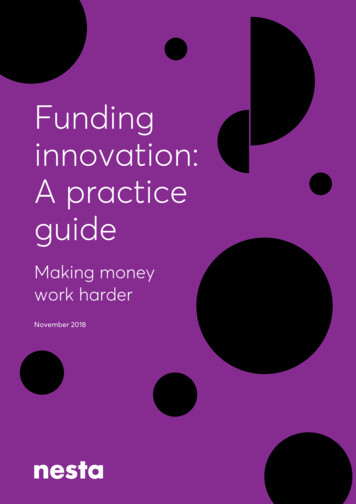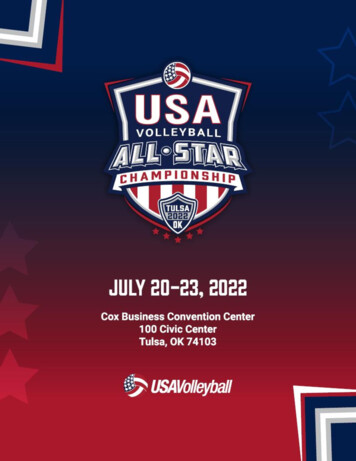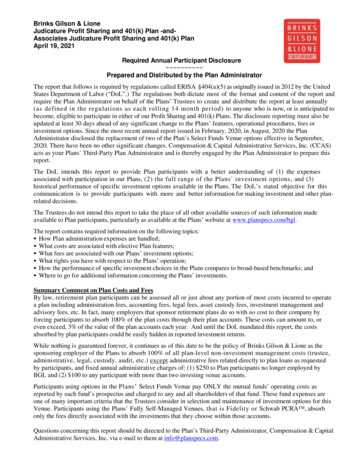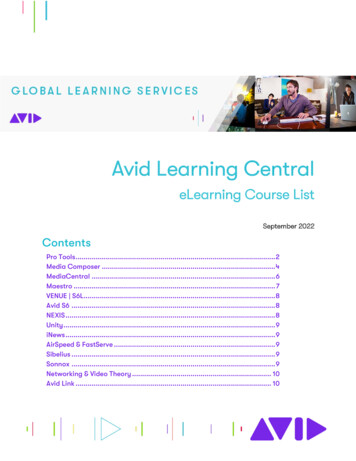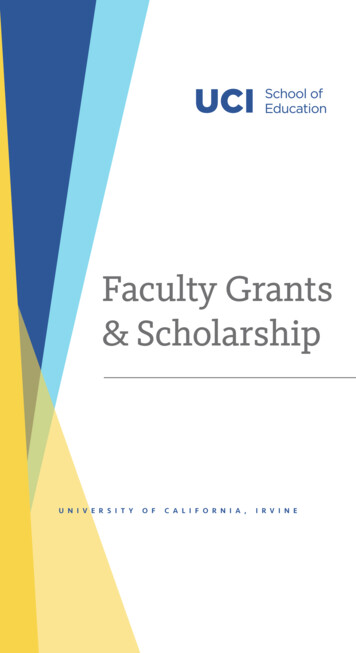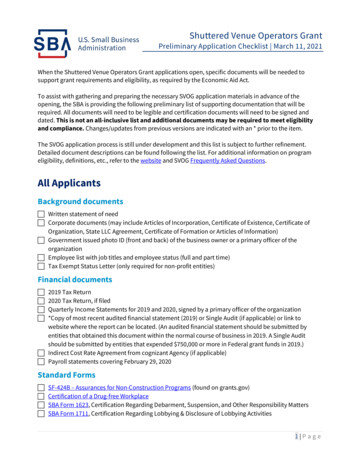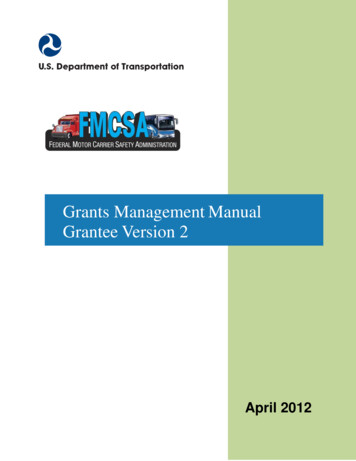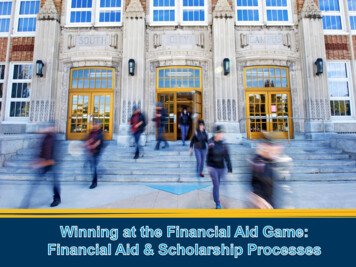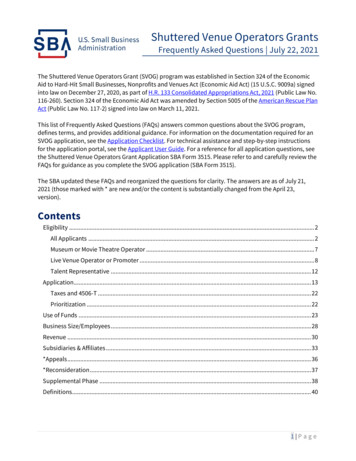
Transcription
Shuttered Venue Operators GrantsFrequently Asked Questions July 22, 2021The Shuttered Venue Operators Grant (SVOG) program was established in Section 324 of the EconomicAid to Hard-Hit Small Businesses, Nonprofits and Venues Act (Economic Aid Act) (15 U.S.C. 9009a) signedinto law on December 27, 2020, as part of H.R. 133 Consolidated Appropriations Act, 2021 (Public Law No.116-260). Section 324 of the Economic Aid Act was amended by Section 5005 of the American Rescue PlanAct (Public Law No. 117-2) signed into law on March 11, 2021.This list of Frequently Asked Questions (FAQs) answers common questions about the SVOG program,defines terms, and provides additional guidance. For information on the documentation required for anSVOG application, see the Application Checklist. For technical assistance and step-by-step instructionsfor the application portal, see the Applicant User Guide. For a reference for all application questions, seethe Shuttered Venue Operators Grant Application SBA Form 3515. Please refer to and carefully review theFAQs for guidance as you complete the SVOG application (SBA Form 3515).The SBA updated these FAQs and reorganized the questions for clarity. The answers are as of July 21,2021 (those marked with * are new and/or the content is substantially changed from the April 23,version).ContentsEligibility . 2All Applicants . 2Museum or Movie Theatre Operator . 7Live Venue Operator or Promoter . 8Talent Representative . 12Application . 13Taxes and 4506-T . 22Prioritization . 22Use of Funds . 23Business Size/Employees . 28Revenue . 30Subsidiaries & Affiliates . 33*Appeals . 36*Reconsideration . 37Supplemental Phase . 38Definitions . 401 P a g e
EligibilityAll Applicants1. What is the legal authority for the SVOG Program?The details of the SVOG program, as amended by the American Rescue Plan Act in March 2021, can befound at 15 U.S.C. § 9009a.2. What is an “eligible entity” for an SVOG?Eligible entities may be live venue operators or promoters, theatrical producers, live performing artsorganization operators, museum operators, motion picture theatre operators or owners, and talentrepresentatives, per the Economic Aid Act. Additionally, entities of these types owned by state orlocal governments (for example, museums or historic homes) are eligible to apply if the governmentowned entity acts solely as a venue operator, museum, etc. and does not engage in other types ofactivities.For example, a city parks and recreation department that operates a bandstand and separatelyoperates various nature parks could apply as an eligible entity for the bandstand, but could notinclude the nature park entities.Finally, each subsidiary business owned by an eligible entity that also meets the eligibilityrequirements in its own rights could apply as an eligible entity.3. When does a business have to have been established to be eligible to apply for an SVOG?The business must have been in operation as of February 29, 2020.4. *Is an entity that did not have revenue in 2019 but was conducting business operations onFebruary 29, 2020, eligible to apply for an SVOG?Yes, if an entity did not have revenue in 2019 but was conducting business operations on February 29,2020. Conducting business operations includes incurring costs of necessary start-up and preparatoryactivities in the lead time before an anticipated opening date. The applicant must show the requiredearned revenue loss.5. Is an entity that applied for and received a Paycheck Protection Program loan before August 9,2020, eligible to apply for an SVOG?Yes. However, under the law, entities will be ineligible for a PPP loan AFTER they receive an SVOG.6. Is an entity that applied for a First Draw or Second Draw PPP loan on or after December 27,2020, eligible to apply for an SVOG?Yes. However, under the law, entities will be ineligible for a PPP loan AFTER they receive an SVOG.7. If an entity applied for a PPP loan after the American Rescue Plan Act became law but before thePPP application form was updated, is it still eligible for an SVOG even though the PPPapplication included a certification saying the entity would not apply for an SVOG?Yes. However, under the law, entities will be ineligible for a PPP loan AFTER they receive an SVOG.2 P a g e
8. How will receiving a PPP loan affect an eligible entity’s SVOG award?Per the American Rescue Plan Act, any entity that receives a PPP loan on or after December. 27, 2020(whether First Draw or Second Draw), will have the PPP loan amount deducted from the SVOGamount. (If the entity received both a First Draw and Second Draw PPP Loan after December 27, 2020,the combined amount will be deducted from the SVOG.)For example, if a jazz club received a PPP loan for 10,000 on February 1, 2021, and then applied forand received an SVOG which, based on the amount of its earned revenue loss would have been 100,000, the jazz club’s SVOG will be reduced by 10,000 and it will receive a 90,000 SVOG. Any PPPborrower that received a PPP loan before December 27, 2020, however, will not have the PPP loanamount deducted from any subsequent SVOG.9. If a portion of my PPP loan was forgiven, will that affect how much of the loan amount isdeducted from my SVOG?No. The full amount of any PPP loan received on or after December 27, 2020, must be deducted froman entity’s SVOG without regard to whether a portion of that PPP loan was forgiven or not. If theentity received a PPP loan prior to December 27, 2020, the PPP loan and/or its forgiveness status isnot factored into an SVOG.10. Can a mobile, portable, or touring facility be a qualifying venue for an SVOG?Yes. Any venue, including traveling tent shows such as circuses and festivals, that meets all therelated requirements in the Economic Aid Act (e.g., defined performance and audience spaces,lighting rig, etc.) will be considered an SVOG-qualifying venue.11. Is a venue with no fixed performance space eligible to apply?No. Venues must have defined performance and audience spaces. If a particular venue cannot meetthis requirement, it is not eligible to apply for an SVOG.12. What disqualifies an entity from SVOG eligibility?Circumstances that would preclude an otherwise-eligible entity from an SVOG include: It does not have a place of business located in the United States, does not operate primarilywithin the U.S., and does not make a significant contribution to the U.S. economy throughpayment of taxes or use of American products, materials, or labor. It was not in operation as of February 29, 2020. It is a publicly traded corporation or is majority owned or controlled by a publicly tradedcorporation. It presents live performances of a prurient sexual nature or derives more than a de minimisamount of gross revenue, either directly or indirectly, from the sale of products or services, or thepresentation of any depictions or displays, of a prurient sexual nature. More than 10% of its 2019 gross revenue came from the Federal government (not countingdisaster assistance) It owns or operates venues, theatres, museums, or talent agencies in more than one country,owns or operates venues, theatres, museums, or talent agencies in more than ten states, ANDhad more than 500 employees as of February 29, 2020. Five other firms with which it is affiliated have already received SVOG awards. If all of the following are true: it is a museum and other museums with which it is affiliated havealready received 10 million in SVOG funding.3 P a g e
13. Is a seasonal entity eligible for the SVOG program?A seasonal entity may be eligible for this program. However, entities that operate seasonally will besubject to alternative rules on establishing gross and earned revenue loss, qualifying for priorityperiod funding, and documenting eligibility to accommodate for the seasonal nature of the business.14. *If an entity is part of a private university, how will the SBA apply the SVOG eligibility barrierthat prohibits organizations which received more than 10% of their 2019 gross revenue fromFederal funding?If a private university owns less than a majority of an eligible entity with separate legal existence, theentity only needs to consider whether more than 10% of its own 2019 gross revenue came fromFederal funding.If a private university-based eligible entity lacks separate legal existence from its parent university, orhas separate legal existence but is majority owned or controlled by the university, it will have to lookto the gross revenue of its parent university when determining whether it passes the barrier againsthaving more than 10% of its 2019 gross revenue come from Federal sources (excluding disasterassistance).NOTE: Public university-based eligible entities are not subject to the 10% cap on the Federal share oftheir gross revenue because they are owned by state or local governments. See FAQ #20 in thissection below.15. If a non-profit foundation’s principal business activity is soliciting donations for a museum orlive venue operator or promoter, is that foundation eligible?No. Under such an arrangement the foundation’s principal business activity would be serving as afiscal agent for the university-owned museum or live venue operator or promoter rather than actingas a museum operator or live venue operator or promoter as is required by the Economic Aid Act.16. For private college and university-owned entities seeking eligibility, does the 10% Federalfunding barrier include financial aid that is awarded to students such as Pell grants?Yes. Based upon the treatment given Pell grants by the Department of Education, they would beincluded in the amount of Federal funding provided to college and university-owned entities that donot have separate legal existence.17. Are eligible entities owned by public universities, including municipally-owned colleges,considered government-owned eligible entities for the SVOG program?Yes. Eligible entities owned by public universities will be subject to all the same restrictions andexceptions as other government-owned entities.18. If a university owns and operates two eligible entities that are not separate legal entities fromthe university, but are managed by two different university departments with their own budgetlines and professional staffing (though their budgets roll up into the larger university systembudget and staff members are university employees), may the two eligible entities each applyfor an SVOG if they meet all the required criteria?Only if it is a public university (see FAQ #32 in this section). If the university is a private institution, itwould be subject to the restriction against the submission of multiple applications under a single EIN.In that case, both entities would have to be combined into a single application submitted under theuniversity’s EIN.4 P a g e
19. If an eligible entity has applied for or received any grants, loans, or other funding from a stateor local governmental relief program is it still eligible to receive an SVOG?Yes. Receipt of pandemic-related or other assistance from state or local governments does notdisqualify an eligible entity from the SVOG program.20. Does the SVOG eligibility exclusion of entities that received more than 10% of their 2019 grossrevenue from the Federal government apply to eligible entities owned by Tribal, state, or localgovernments, including entities owned by public colleges and universities?No. The Economic Aid Act provides that, for government-owned entities, the eligible entity is the livevenue operator or promoter, live performing arts organization operator, museum operator, movietheatre operator or owner, or talent representative and does not include any government-ownedentity that is not one of those types of entities.The only form of Tribally owned entity that is eligible for SVOG assistance is a Tribally ownedmuseum. Tribally owned museums are specifically authorized to be eligible for SVOG assistance. TheEconomic Aid Act did not explicitly include tribes as a form of government, but the SBA considerstribes as government entities in its financial assistance programs.21. Are service and support companies that provide stages, lighting, sound, casts, and othersupport for live performing arts events or which showcase performers or pre-packagedproductions to potential buyers eligible to apply for an SVOG?No. The Economic Aid Act is designed to assist only those eligible entities identified in the statute.SVOGs are not available for service providers that support eligible entities.22. *Are entities whose broader business operations include hosting live performing arts events,such as agricultural fairs or party boats/pleasure cruises that feature concerts, eligible?Maybe. To be eligible, an agricultural fair or entertainment cruise must show that its principalbusiness activity is presenting live performing arts events that also include other secondary activitiessuch as agricultural shows or boat tours. Its principal business activity must be acting as one ofeligible entity types in the statute.23. Are applicants currently involved in bankruptcy proceedings eligible?Possibly. Eligible entities undergoing a reorganization form of bankruptcy (such as Chapter 11 orChapter 13) may apply for an SVOG if they entered bankruptcy after February 29, 2020. However,entities undergoing a liquidation form of bankruptcy (such as Chapter 7) are not eligible because theSVOG program is intended for entities that are currently operating or intend to resume fulloperations.In addition, SVOGs made to entities undergoing reorganization bankruptcy may, in SBA’s discretion,be subject to additional documentation requirements designed to reduce the risk of loss of taxpayerfunds.24. Are entities located in US territories eligible?Yes. Under the Economic Aid Act, in addition to those located in states, eligible entities in the Districtof Columbia, the Commonwealth of Puerto Rico, and any other territory or possession of the UnitedStates (e.g., Guam, American Samoa, the U.S. Virgin Islands) are able to apply for an SVOG.25. Is an entity that received CARES Act funding eligible to apply?Yes. Per the Economic Aid Act, receipt of CARES Act funding does not disqualify an entity for SVOGs.5 P a g e
26. Does a cruise ship count as a qualifying venue for promoters or producers to stageperformances on or for a talent representative to book performers?The cruise ship itself would likely not be eligible. However, a cruise ship may serve as a qualifyingvenue for the business activities of eligible entities if it meets all the venue requirements establishedunder the Economic Aid Act (defined performance and audience spaces, lighting rig, mixingequipment, etc.). For example, a promoter that books performances on cruise ships would be eligibleto apply for an SVOG.27. Must a promoter, theatrical producer, live performing arts organization, or talentrepresentative stage all its events or book all its clients at qualifying venues?No, they must use qualifying venues for a majority of the events (more than 50% they stage or bookclients into. Requiring these types of eligible entities to exclusively use qualifying venues would fail torecognize the reality of live performing arts industry business operations and lead to the extremeresult of the SBA excluding otherwise eligible entities for something as slight as having used a singlenon-qualifying venue. As such, the SBA has interpreted the Economic Aid Act to require a promoter,theatrical producer, live performing arts organization, or talent representative to use qualifyingvenues for a majority of the events (more than 50%) they stage or book clients into.28. If an entity qualifies under two different categories of eligible entities (for example, a museumand a live venue operator) which category should be used when applying?If an entity can meet all the requirements for more than one type of eligible entity, it is recommendedthe entity pick the entity type that gives the strongest case for eligibility or that best represents itsprincipal business activity.29. What is “de minimis gross revenue” from the sale of products or services, or presentation of anymaterials of a prurient sexual nature that allows an entity to be eligible for an SVOG?In applying this restriction imposed by the Economic Aid Act, the SBA is following longstandingAgency practice from its financial assistance programs and holding that 5% or less is a de minimisamount of gross revenue.30. If an entity receives state funding that originated from the Federal government, does this counttoward the 10% eligibility threshold for revenue from the Federal government?Yes, unless that funding originated as Federal disaster assistance.31. What types of Tribally-owned entities are eligible to apply?The Economic Aid Act does not include Tribes in its definitions of states or political subdivisions ofstates, which are both permitted to own eligible entities. However, the Act’s definition of “relevantmuseum operator” references section 273 of the Museum and Library Services Act (20 U.S.C. 9172),which specifically includes Tribal museums. As such, Tribally-owned museums are the only Triballyowned entities eligible for SVOGs.32. *Because government-owned eligible entities generally operate as divisions of Tribal, state, orlocal governments and do not have their own EINs or separate legal existence, will the SBA lookto the governmental owners of such entities for purposes of determining the principal businessactivity?No, the SBA examine the principal business activity of the applying itself and not solely consider theoperations of its owner, even where the entity uses the EIN of its government-owner or parentcompany.6 P a g e
33. Are performing arts groups like choirs, dance companies, etc. eligible for SVOG awards?Yes, if they can meet the definition of a performing arts organization operator and all the relevanteligibility criteria, such groups would be eligible.34. Can an entity with no staff or payroll qualify for the program?Yes. For example, an entity such as a promoter or talent representative that operates as a soleproprietorship or single member LLC with no employees could be eligible for an SVOG. In such a case,it would use its SVOG funding for non-payroll costs such as the payment of rent, utilities, scheduleddebts, maintenance fees, taxes, etc.35. If an SVOG-related business was previously owned or operated by an ineligible entity (forexample, a movie theatre owned by a national chain listed on a stock exchange) but has sincebeen sold or otherwise transferred to an owner or operator that does meet the eligibilitycriteria could the transferred business serve as the basis for, or be included in, an SVOGapplication?Yes. The SBA will determine SVOG eligibility as of the date an entity submits its application for theprogram. The fact that a venue, theater, etc. was previously owned or operated by an ineligibleorganization will not affect an applicant’s eligibility.36. How did the SBA determine that to be eligible for SVOG assistance an entity could not dobusiness in certain identified countries?The Consolidated Appropriations Act of 2021, which includes the Economic Aid Act, states that SVOGfunds may not be obligated or expended to directly finance any assistance or reparations for thegovernments of Cuba, North Korea, Iran, or Syria. In addition, the United States has imposedsanctions on these four nations through the Department of the Treasury’s Office of Foreign AssetsControl which cover things such as financial and trade transactions with entities, institutions, andindividuals within their borders.Museum or Movie Theatre Operator37. Are motion picture theatre owners eligible to apply?Yes. Per the Economic Aid Act, motion picture theatre operators include individuals or entities thatown or operate at least 1 place of public accommodation for the purpose of motion picture exhibitionfor a fee.38. *Is a museum or movie theatre with a multipurpose room with movable seating eligible?No, if the only auditorium or room in the museum or movie theatre has temporary, removable,modular, convertible, or other non-fixed seating arrangements, it would not be eligible. TheEconomic Aid Act specifically requires museums and motion picture theatres have fixed audienceseating. In order to qualify for SVOG, applying museums and motion picture theatres must have atleast one room with fixed audience.NOTE: There is no fixed audience seating requirement for other types of eligible entities.39. Is a museum or movie theatre with outdoor fixed seating eligible to apply?Yes. The Economic Aid Act does not require qualifying venues to be indoors.40. Is a museum funded by a non-federal government entity, such as a state, eligible?Yes.7 P a g e
41. Is a drive-in movie theatre eligible to apply?No. Per the Economic Aid Act, a motion picture theatre operator or owner must have at least oneauditorium with a motion picture screen and fixed audience seating, so a drive-in movie theatre isnot eligible to apply for an SVOG.42. If a museum has more than one qualified auditorium, theater, performance or lecture hall, oroutdoor amphitheater, does regular programming need to occur in each, or is it sufficient tohave regular programming within all the qualifying presentation spaces?A museum may aggregate programming across all such spaces for purposes of meeting the regularprogramming requirement rather than looking at each qualifying presentation space individually if amuseum has multiple qualifying presentation spaces (auditoriums, theaters, performance or lecturehalls, or outdoor amphitheaters).43. *What happens if a motion picture theatre is owned by one entity, but operated (managed) by aseparate entity? Are both entities eligible for an SVOG in such a case? If so, what will the earnedrevenues of the two companies be based upon?Yes. Under the Economic Aid Act, owners and operators of motion picture theatres are consideredeligible entities.In cases where both the owner and the operator of a qualifying motion picture theatre separatelyapply for SVOG, each will base its earned revenues upon its share of those payments received as acondition of its ownership or operation of the motion picture theatre. This could include but is notlimited to space rental, ticket sales, management fees, digital projection reimbursements, and othernon-gratuitous payments or transfers as allocated by contract, lease, or other formal legalagreement. All earned revenues and claimed grant expenses must be tracked and accounted forseparately to avoid any overlap or double-counting.44. Is a landlord who owns a shopping center that includes a movie theatre eligible to apply for anSVOG given they ‘own or operate’ an eligible motion picture theatre?It is not likely. Because a shopping center owner’s principal business activity would most likely beowning or operating a shopping center rather than owning or operating a motion picture theatre, it isdoubtful it would be eligible for an SVOG.45. To qualify as regular programming, does the programming provided in a museum’s theaterneed to be ticketed and open to the general public?No.46. If a motion picture theatre operator owns and/or operates multiple theatres which it includes inits SVOG application, must each individual theatre included in the application meet theeligibility criteria?Yes.Live Venue Operator or Promoter47. Is a wedding/event venue eligible to apply?It is not likely. Per the Economic Aid Act and specific eligibility criteria applying to Live VenueOperators, wedding venue operators would likely fail to meet multiple requirements (e.g. sale oftickets, promotion of events to the public, defined audience and performing space, lighting rig, soundmixing equipment, employment of sound engineers, stage managers box office managers, etc.).8 P a g e
48. Is a sports stadium or venue used for concerts and other live, non-sport performances eligibleto apply?It is not likely. However, if the operator of a sports stadium or similar athletic arena can meet thestatutory definition of an eligible entity under the Economic Aid Act, including the requirement thatits principal business activity must be the organization, promotion, management, or hosting of liveconcerts, comedy shows, theatrical productions or other events by performing artists, it may beeligible to apply for an SVOG.49. *Is a restaurant that features live music eligible to apply?Maybe. If the provision of food and drink are incidental to regular live performing arts activities, suchas a jazz or comedy club, the entity may be eligible to apply. However, if the principal line of businessis restaurant operation rather than live venue operation, the business would not be eligible to applyfor an SVOG.50. *Is a dinner theatre eligible to apply?A dinner theatre could qualify if its principal business activity is the organization, promotion,management, or hosting of live concerts, comedy shows, theatrical productions or other events byperforming artists. \If the principal line of business is restaurant operation rather than live venueoperation, the business would not be eligible to apply for an SVOG.51. Is a performing arts center owned and operated by a government or state college (as a collegedepartment) eligible to apply?Yes.52. Is an air show operator eligible to apply?No. The live venue operator or promoter definition under the Economic Aid Act requires an entity toeither put on performing arts events at qualifying venues or sell advance tickets to performing artsevents at qualifying venues. While an air show is a form of live entertainment, it does not constitute aperforming art. As such, air show operators do not qualify as live venue operators or promoters.53. Is a company that uses 1099 (independent contractor) workers/talent (vs. W2 employees)eligible to apply?Yes. Per the Economic Aid Act, payments made to independent contractors as reported on an entity’sForm-1099 are an allowable use of grant funds.54. *Is a theatrical production management business with revenue generated by the productionmanagement eligible to apply?A theatrical production management business may be eligible to apply if 70% of its earned revenuecame from production fees and reimbursements. Under the Economic Aid Act, it also may be eligibleto apply if, as its principal business activity, it makes production tickets available for public purchaseon average not less than 60 days in advance of the performance date.55. What will SBA count as “earned revenue” for a live venue operator or promoter, theatricalproducer, or live performing arts organization operator?SBA counts all earned revenue, including cover charges or ticket sales, production fees or productionreimbursements, nonprofit educational initiatives, or the sale of event beverages, food, ormerchandise.9 P a g e
56. Is a talent agency that books actors at live venues, but does not operate a live venue, eligible toapply?Yes. A talent agency is eligible to apply if 70% of its operations involve managing, booking, orrepresenting performers who appear primarily at qualifying live venues.57. Does a ticket broker or reseller qualify as a live venue operator or promoter?No. The Economic Aid Act’s live venue operator or promoter definition requires an entity to have asits principal business activity either:(1) Organizing, promoting, producing, managing, or hosting events by performing artists forwhich admission fees are charged and performers are paid based on a percentage of sales, aguarantee, or other mutually beneficial formal arrangement; or(2) Publicly selling tickets on average 60 days in advance of performing arts events for whichperformers are paid based on a percentage of sales, a guarantee, or other mutually beneficialformal arrangement.
Jul 22, 2021
